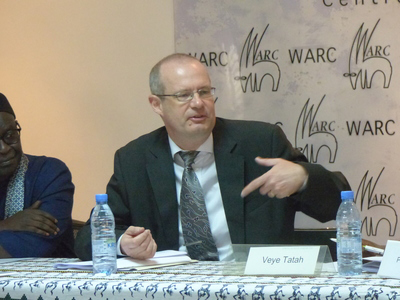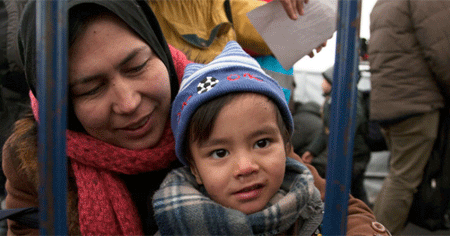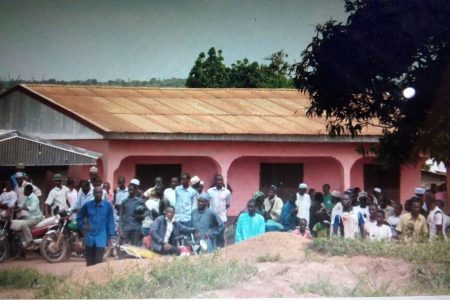On a recent visit to Senegal for the Spring School on Media and Migration workshop, Anthony Akaeze, senior associate editor, spoke with Stephan Roken, German Ambassador to Senegal, Gambia, Guinea-Bissau and Cabo Verde on the burning issue of migration as it concerns Africa and his experience working in the continent. Excerpts:
You’ve worked in a number of African countries as a diplomat. How has the experience been generally?
In general, it’s a very challenging task. I have been only Ambassador in Senegal but I was posted to Cotonou and in Asmara and in Addis Ababa starting in the 1990s. For diplomats, postings in Africa are very interesting because we have a full variety of issues from political issues to questions of economic co-operation to development aid. So it’s challenging but it’s also very interesting because you have a full variety of diplomatic life.
Challenging in what sense?
The challenging thing is that, we are working here with a very small staff; we have to understand the country which is as complicated as any other country in the world but we are only few people. We are trying our level best to have an understanding of the political, economic, social situation but in a country where different languages are spoken, we normally don’t speak the local languages but we communicate in French or English. It is our job to understand the country to see how the people feel and to deduct from that understanding, the right policies for all countries. But the challenge is to really have a deep understanding of the country.
Migration is a topical issue in the world today, as regards people leaving their countries for other countries. Where would you place Senegal when it comes to migration?
Of course there are people in Senegal who want to leave Senegal. I am talking from a German perspective. We have not many Senegalese leaving for Germany but we know that, for the younger generation, there are lots of people who think that they have better economic chances in Europe than they have in Senegal and what we are trying to develop is an economic possibility. To have an income that enables you to have a family and raise your children should also be possible in Senegal. You don’t have to take the dangerous trip of irregular migration to some European countries like Germany.
There are people who feel that getting a visa to some European countries like Germany is difficult. Is it just a question of how much money a person has in his bank account, his educational qualification or class that comes into consideration when attending to visa applications?
Visa processes tend to be complicated. A lot of people think it’s nearly impossible to get a visa for Germany but I don’t think it’s true. What we try to find out in the visa process is, for instance, whether the person has the means to sustain himself in Germany like in the area of securing housing. It depends on the person who invited you and on your economic background. We have to have the screening because we know a lot of people will like to stay in Germany because they think that they have better opportunities there which definitely is not the case and which is not according to the German laws.
As a human being, would you wish to see a world without borders, a world without restrictions where people are free to go to wherever they may want to go?
No, I would not like to see the situation. Everywhere in the world you have borders. I understand if anyone wants to try his luck somewhere else. But you have to be welcomed. It’s the same situation in your house, you want to decide who’s living in your house and not. I know there is a question of charity in the end, but from a historical perspective, I don’t see any situation where there have not always been conflict between migration and the countries where the migrants come from and even if you take those countries that are supposed to be actively looking for people coming to them, you have to have a look what happened to the indigenous population, what happened to them. So it is a conflict and borders are necessary for the political structure, for the political order everywhere in the world. So I can understand people wanting to change base but you also have to understand that the question of whether you are allowed in a certain country or not depends on the host country.
As someone who has lived and worked in Africa, what advice do you have for African leaders? What are the areas you think they need to improve upon generally?
Generally, I think the leaders would want to make their countries a prosperous and better place. They know what they have to do, they know what measures have to be taken to develop the countries economically. If these leaders have to be responding to the people, which means, in a democratic way, if there’s a possibility that the leaders are responsible to their own people, of course, in an election the people have the right to vote for somebody else, for an opposition. That could be, in the end, the right way to develop the countries.
How would you describe diplomatic relations between Senegal and Germany on one hand and Germany and Africa on the other hand in terms of business and other issues?
German relations to Africa is quite good because our colonial past has been very limited to a few countries and it was only for a short period, so to most African countries we have established good political relations. We have not really established good economic relations mostly to some African countries like South Africa or Nigeria because German companies were more active in Europe, Asia and in Latin America but I think that one market of the future will be the African continent so I think there will be more interest of German business communities in the years to come. On the cultural part, I think we have a strong presence of German culture institutes like the Goethe Institute in a lot of African countries. So here, we are on a strong footing and when it comes to big political issues like climate change, Germany has a lot of common positions with most African countries.
What do you like most about Africa; the things that fascinate you about this “continent of no hope”, as some cynics would put it?
It’s the people who live there. The hospitality is really exceptional. I would never say it’s a continent of no hope. It’s a continent with a lot of difficulties but I think the difficulties can be overcome.
Your wife is from Eritrea. Do you mind talking about how you met?
It’s not that difficult. I was posted in 1993 to Ethiopia, in the German Embassy in Addis Ababa but I was incharge of the relations to Eritrea and she had been working in the Eritrean administration at the time and she was in charge of relations to European countries. That’s how we met. We’ve been married since 1995.



